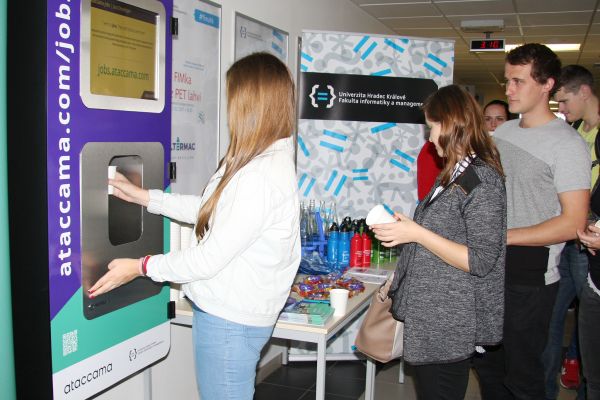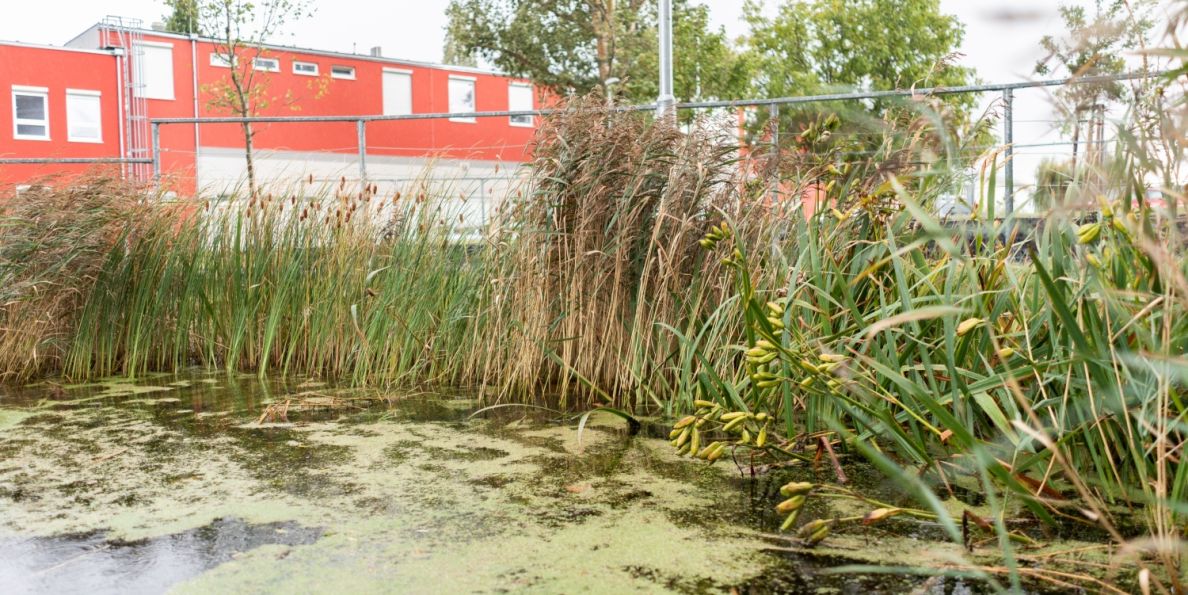Two Czech universities, the Czech University of Life Sciences and the University of Hradec Králové, have been included in the prestigious UI GreenMetric university rankings and both appear in the top half of the list. The rankings rate universities by ecological standards, such as waste management, energy, and transportation. The Czech government intends to support these efforts by allocating 12.5 billion Czech crowns to eco friendly improvements at universities.
A special water filtration device that eliminates the need for hundreds of thousands of PET bottles every year; green roofs on new buildings; and wetland to retain rainwater from roofs. These are just some of the eco friendly features of the Czech University of Life Sciences (CULS), which have earned it a top rating among sustainable universities worldwide. From the 719 universities included in the prestigious international UI GreenMetric rankings, CULS ranks 46th, surpassing institutions such as the Japanese national Hokkaido University and the Canadian University of Ottawa.
The position of CULS is even higher in the European rankings, where it ranks 26th from the 230 evaluated universities. “The rating is an important recognition of our effort. We see it as evidence that we are on the right track when it comes to environmental protection since we can compare ourselves to other institutions worldwide,” says CULS spokeswoman Jana Kašparová.
The top three universities in the rankings are the Dutch Wageningen University & Research, the UK University of Nottingham and the US University of California, Davis.
Trees and footpaths
The UI GreenMetric World University Ranking has been published since 2010 by Universitas Indonesia, the most prestigious Indonesian university, which reaches out to universities that might wish to participate in the rating. The rankings assess, in great detail, the following six areas: infrastructure, energy and climate change, waste management, water management, transportation, and education. The factors assessed include the efficient use of electric energy based on the total number of students and staff at the university, programmes for reducing the amount of plastic and paper waste, systems for sorting recyclable waste, and toxic waste management.
“Our best category was energy and climate change. Each piece of information that we provided had to be backed up by documentation so that it could be verified,” says Kašparová. For example, the university had to show where trees grow at the campus and the area they cover. “It sounds almost funny, but we also had to show that we had footpaths at the university to support walking instead of driving. Similarly, we had to provide schedules for public transport lines to the university campus and photographs of our energy efficient appliances and solar panels with a description of their purpose,” she explains.
Eliminating plastic cups
One of the improvements CULS could show the assessors was a water filtration device, which looks like a vending machine and reduces the need for single use PET bottles. The university can currently boast three smaller machines although in the upcoming weeks it will install a large outdoor machine, which could potentially save up to 200,000 half litre PET bottles a year.
“Obviously, we also use smart technology for our new buildings. Our new pavilions have – or will have – green roofs. The new pavilion of the Faculty of Tropical AgriSciences, which is now under construction, will take advantage of energy piles used to store and transmit heat,” says Kašparová. Moreover, the CULS campus includes its own wetland, which retains water and is also used for research and education purposes.
Besides smart technologies and water filtration systems, CULS also intends to tackle the issue of plastic cups. “We are currently looking at reducing the use of single use plastics, especially at university events such as our Garden Party,” concludes Kašparová.
Non destructive sources
Another Czech contender, the University of Hradec Králové (UHK), also ranks in the top half of the rankings – 350th in the worldwide rankings and 127th from European universities.
“We share the need to fight against the human contribution to climate change, to preserve the biological diversity of our planet, and to use non destructive sources of energy whenever possible,” says toxicologist and UHK Rector Kamil Kuča.
To be included in the rankings is particularly beneficial for the university from the point of view of attracting international students, who follow these and similar rankings and make their decisions based on them. “By being included in the rankings, our university gains prestige and becomes more attractive to these students. And Hradec Králové really is a very green city, so it would be a shame not to use this advantage to create an attractive brand,” says UHK spokesman Jakub Novák. The university applied to be included in the rankings based on conversations with representatives of other universities at international university fairs.
Free filtered water
Similar to CULS, the latest eco friendly addition at UHK is also a water microfiltration system installed at the campus in the building of the Faculty of Informatics and Management (FIM). Whenever someone wants to fill their water bottle at the machine, it runs regular tap water through a filter to achieve the required quality, which eliminates the need to package, store, and transport the water. Moreover, the service is provided free of charge.

“We are proud to be the first to install this type of system in the Czech Republic outside of Prague. In just one year, the system has already eliminated 61,200 half litre PET bottles, which is about 1.5 tons of plastic,” says Josef Hynek, the dean of FIM UHK.
The university also supports cycling by making sure that bicycle parking is widely available throughout the campus. “As regards the campus infrastructure, we try to make sure that the bicycle paths are directly accessible from the campus and that students who have a bike can use them exclusively instead of a car,” says Novák.
To be more eco friendly, the university is working on reducing its fleet and is looking for alternative forms of transportation. It is also running programmes to reduce printing throughout the university by recommending two sided printing or, preferably, digital correspondence and documents, and by using special recycled paper.
The university is now planning to install more water filtration machines in as many of the UHK buildings as possible. “At the same time, we keep expanding the space and number of bins to improve our recycling programme. We are now also researching electric cars since we would like to gradually replace the cars in the university fleet with electric cars,” adds Novák.
Eco friendly trends at other Czech universities
Eco friendly innovations are also taking place at other Czech universities that did not participate in the rankings. For example, the Czech Technical University in Prague is currently looking to reduce its consumption of single use plastic cups.
The CTU Faculty of Architecture now uses specially made returnable cups, which are used at all faculty events to minimise the amount of waste.
The CTU Faculty of Biomedical Engineering, on the other hand, has built a new laboratory wing with the highest possible energy efficiency class “A” rating. Ida Skopalová from the faculty gives an overview of the eco friendly features: “Rather than using air conditioning, we installed electric slatted blinds on the south facing side of the building. We also finished the internal remodelling of the buildings in 2018, which also reduced the energy consumption of the buildings. Students can take advantage of the water coolers installed in the relaxation zones and there are recycling bins on every floor.”
Another interesting improvement was showcased by CTU at the Gaudeamus fair in Prague this January. As Andrea Vondráková from the CTU Rector's Office describes, “We were offering our potential students Blue Lion lemonade in cups made from PLA, which although it looks like regular plastic, is actually made from plant biomass starches using cereal crops and cellulose. It is biodegradable and compostable.”
12.5 billion crowns to support more eco friendly buildings
The government also intends to support eco friendly trends at universities. Last year, it approved a new investment programme to develop and renovate university buildings and reduce their energy consumption. Universities can also use this funding to buy new equipment and IT technologies. Between 2018 and 2027, the government will allocate 12.5 billion crowns from its budget for these purposes.
“We developed the programme together with the universities based on their needs. We are looking to improve and modernise the facilities used by students and academic staff,” says Robert Plaga, the Czech minister of education, adding: “I am glad that the programme also paves the way to the sorely needed improvements to student dormitories and canteens.”
A total of 2.5 billion crowns from the total amount is set aside for dormitories and canteens and universities will compete for the budget in a series of tenders, the first of which is expected at the end of this year.
